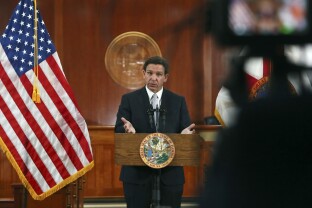Florida is waving off the federal requirements of President Joe Biden’s landmark infrastructure law while still spending the $320 million the legislation doles out for the state.
The federal government seems fine with it.
In November, the state’s transportation secretary said that Florida had decided “to not participate in the continued efforts” of the Carbon Reduction Program, a green infrastructure fund created by the 2021 Infrastructure Investment and Jobs Act (what the Biden administration touts as the Bipartisan Infrastructure Law).
